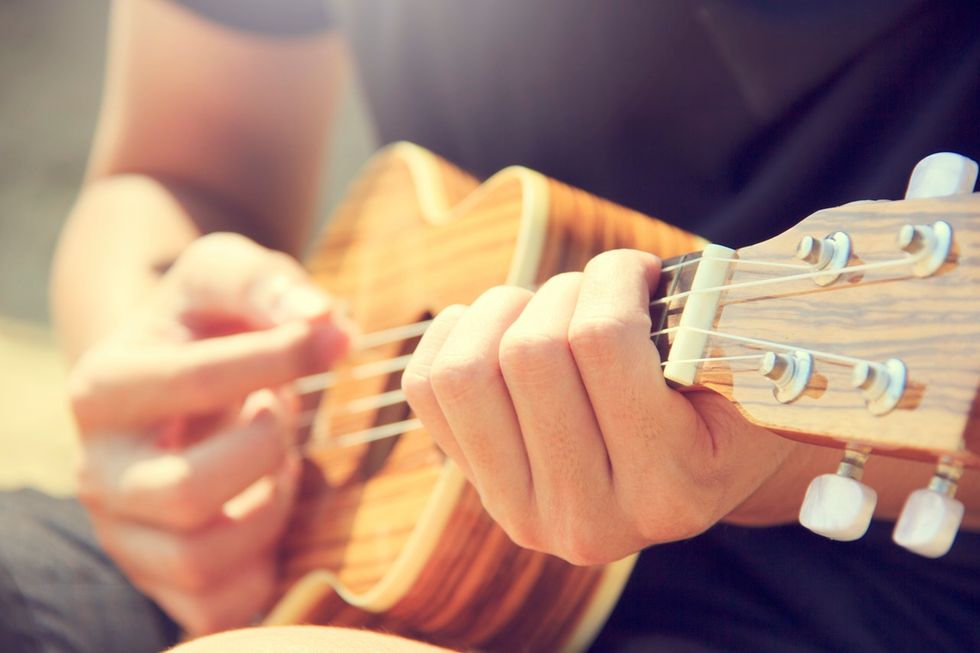What’s a third the size of a guitar and three times the fun? That would be a ukulele, the most recent addition to my family’s collection of musical instruments. By no means do I come from a family of musicians.
While my mother played the clarinet in high school, and my father is a self-taught guitarist who has been playing since college, musicality has never been my strong suit. I dabbled in the electric keyboard, though there was only so much I could learn from teaching myself, and I attempted violin, although that proved to be too difficult to learn without lessons as well.
Finally, I settled on being mediocre at guitar—meaning that I can play some basic chords and a few songs, but only with a great deal of practice and patience. And then last week my family bought a ukulele. A somewhat spur of the moment decision, we came across a ukulele vendor at a local outdoor market and thought it would make a good gift for my father since he is so inclined towards guitar—and a ukulele is kind of like a mini guitar, right? Right.
I underestimated how much I would enjoy a ukulele. Unlike the guitar, which makes your fingertips scream (until you numb them over with callouses) and joints ache as you attempt to stretch your hands across three or four frets, ukulele is perfectly suited for those like myself who have limited phalangeal dexterity. It’s like a baby guitar for people with small hands.
If you’ve ever wanted to learn an instrument, or have tried and never been successful, I recommend that you pick up a ukulele. Playing chords on a ukulele is very easy because the frets are so close together, even in the larger sizes, and some chords are just one finger on one string in one fret. In fact, ukulele is so easy to learn that within hours of purchasing ours, my brother and I had already learned six chords and could play two different songs.
What’s more, if you have a background in guitar or another stringed instrument (or even piano), ukulele will come to you that much easier because you’re already familiar with playing chords and notes on a fret board with strings (or on a piano with keys). Even my mediocre background in guitar has given me an advantage in learning to play the ukulele—in just a few days of practicing for an hour a day or less I had learned over 15 chords and around a half dozen songs, which I consider to be a huge amount of progress in a short period of time.
If the price of most instruments is what’s preventing you from making a commitment to bringing music into your life, good news; ukulele’s start as cheap as $25 for a beginner’s composite ukulele, and $50 for a good quality wood ukulele, but they can also range up in price to $200 dollars or more. Additionally, ukuleles come in three different sizes: soprano, tenor, and concert, with soprano being the smallest and concert being the largest. The size of the ukulele you want depends on a combination of budget, musician, and desired sound quality.
For example, my family purchased a mahogany tenor ukulele, which is a mid-sized ukulele with a longer neck and larger body than a soprano ukulele. This allows both my six-foot-tall brother with his sasquatch hands and me with my tiny lady hands to both be able to play chords comfortably without having to cram our fingers together or stretch them too far. Plus, our tenor ukulele has a fuller sound than a wooden soprano or composite ukulele of any size, because wood has a richer sound than composite.
In terms of sound, a ukulele may be small, but it does not disappoint. A ukulele sounds great as a complement to a guitar in a duo, and can also hold its own alone with a mellow, almost whimsical tone that automatically lifts your spirits to hear it.
The breadth of music written for ukulele—or even guitar that you can play on a ukulele—is also vast and encompasses a variety of genres. With a ukulele, you can play chill Ingrid Michaelson tunes, but you can also play some punk Twenty One Pilots music and pop Ed Sheeran songs, as well as a lot of music from movies and television shows, so you needn’t worry about not being able to play music that you like.
Best of all, a ukulele is extremely portable which means that you can almost literally bring it with you everywhere: in the car, on a boat, to college (it will store very easily in a dorm), or wherever it is you plan to go. With a ukulele, you can always be sure that you bring a little music with you wherever your travels take you.































